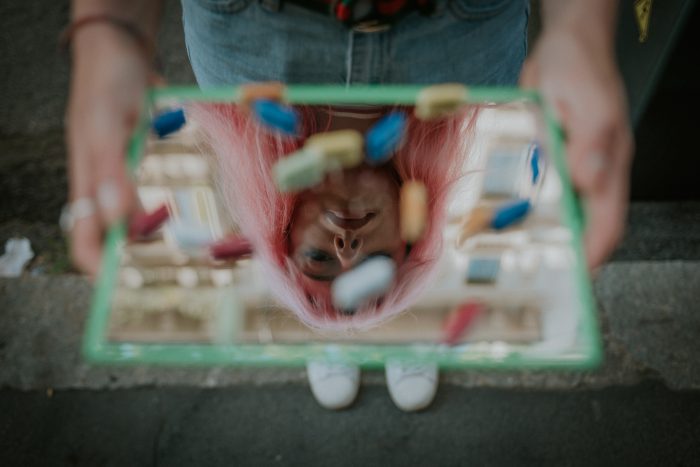We can become addicted to almost anything—our phones, food, substances, alcohol, social media, the list goes on.
We tend to throw around the idea of addiction in a nonchalant way. I’m addicted to chocolate—I couldn’t live without it! But physical and behavioral addictions are real, and we can easily become addicted to things without even knowing it.
The hardwiring of our helpful brain processes respond to substances or repeated activities. The more we consume drugs or alcohol, count the number of likes we get on social media, or push for that extra mile on the treadmill, the more our brains and bodies get used to the dopamine that’s released to make us want to do it again…and again.
This is how an addiction forms—our brains respond to the good feelings we get when we do something, resulting in changes in emotions, cravings, and compulsions.
Here are 12 signs that we’re addicted to something:
1. We can’t stop the behavior.
Despite attempts to curb a certain behavior, it can feel nearly impossible to let it go because our brain is telling us that we need that substance or activity to survive and feel normal.
If you’ve tried to quit smoking but keep reaching for the pack when you start to crave it, you might be addicted. When we try and fail repeatedly to stop certain behaviors, it’s a clear sign that it might be getting out of our control.
2. We feel withdrawal if we try to stop.
With physical substances like drugs and alcohol, we might feel withdrawal symptoms like nausea, trouble sleeping, or agitation.
Behavioral addictions—like an addiction to exercise, social media, or video games—can also come with symptoms of withdrawal. With both behavioral and substance addictions, we might feel anxious or depressed when we try to stop doing it.
3. Our life revolves around it.
Addictions are all-consuming. Our entire lives now revolve around that thing, even if we wish it didn’t. Suddenly, all of our life choices are being made around the behavior, and we continue to engage in the choices that allow us to continue the behavior.
4. We don’t feel normal without it.
When we’re addicted to something, we need it to feel normal. The behavior might provide happiness, euphoria, or a calmed mental state—all of which may now be hard to attain without the help of the substance or behavior.
5. Our bodies and appearances start to change.
Our bodies can go through big changes when we’re addicted to something. If we struggle with food or exercise, we might see major changes in our weight. Or, if we become addicted to a substance, we’ll probably experience symptoms like dilated pupils, changes in skin and complexion, or hair loss.
Oftentimes, when we’re addicted to something, there’s a lack of interest in maintaining personal hygiene. When we’re spending most of our time engaging in a certain behavior, we might not be motivated to shower, brush our teeth, or comb our hair.
6. We’re doing it more than we intended.
We might be addicted to something if we only intend to use or do something for a certain amount of time, but then end up overdoing it. We all overdo certain things now and then, but it’s an addiction when we go further than we intended every time we engage in that activity.
7. We’re hurting our relationships.
Relationships are almost always hurt in the wake of addiction. Because addictions are all-consuming and compulsive, people tend to ignore their friends, families, and significant others in the pursuit of their addictions.
If we find ourselves withdrawing from the people we love because of what we’re doing, we might have an addiction. We might miss phone calls with friends, consistently dip out early from social gatherings, or turn to a substance or activity instead of our loved one in times of difficulty.
8. We neglect responsibilities.
Addictions can make everything else in our lives seem less important. Over time, important factors of life like school or work might take a back burner. When we start missing important meetings and slip on paying bills, it might be a sign that the behavior is becoming an addiction.
9. We deny or minimize the problem.
When other people confront us about the behavior, we might minimize the issue or deny it altogether. Even when the problem is evident, we might continue to tell ourselves that we can stop any time we want, and it’s no big deal.
10. We’re lying or keeping secrets.
We might be addicted to something if we have to lie to other people to keep it hidden. We could be making up excuses for going home, telling family members that we’re not doing it anymore, or keeping it completely under wraps because we don’t want anyone to know.
11. We take risks we usually wouldn’t.
Addictions can lead us to do riskier things—things we never would have considered doing before. People with addictions might lie or steal, drive intoxicated, slip up on work responsibilities, or take other risks just to keep the addiction going.
12. It becomes our emotional escape.
One of the most prominent signs of addiction is when that activity becomes our primary escape. It’s not inherently wrong to have an escape—it can be healthy and helpful to have therapeutic things to turn to when we’re stressed.
But when it becomes our only mode of emotional escape, it might be a problem. With addiction, we’re replacing valuable people and healthy outlets with a substance or harmful behavior.









Read 0 comments and reply